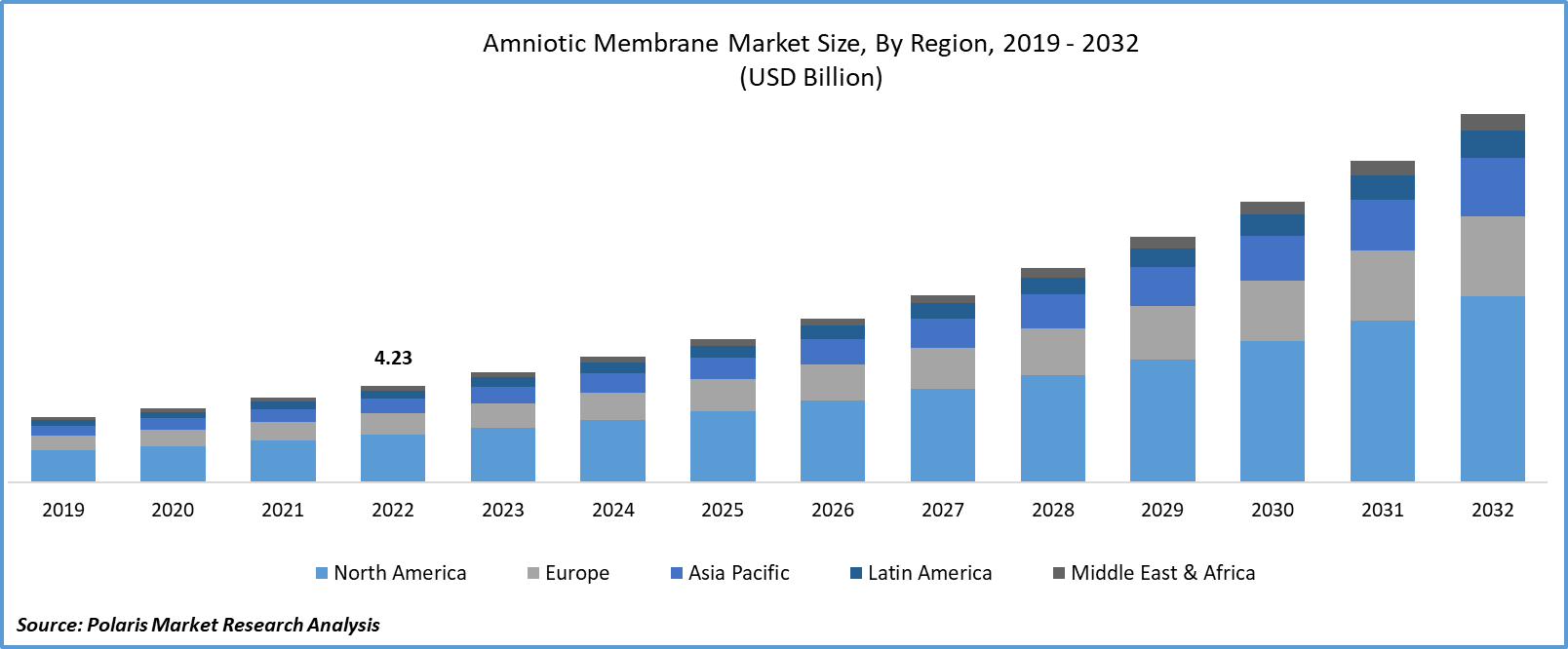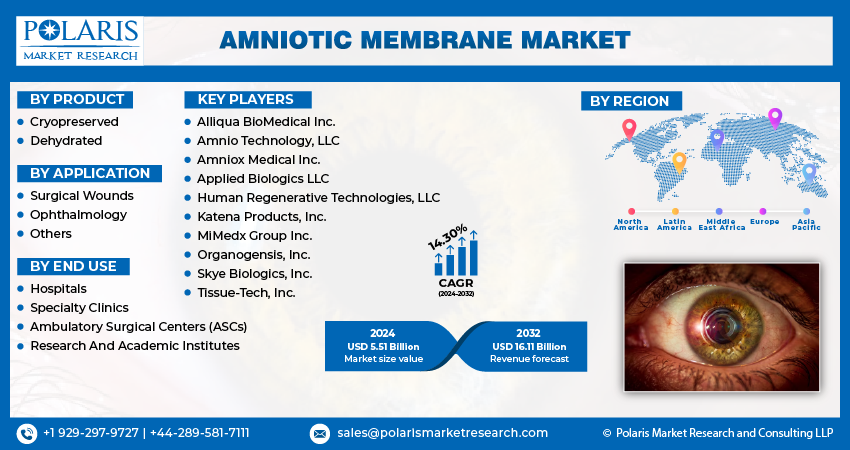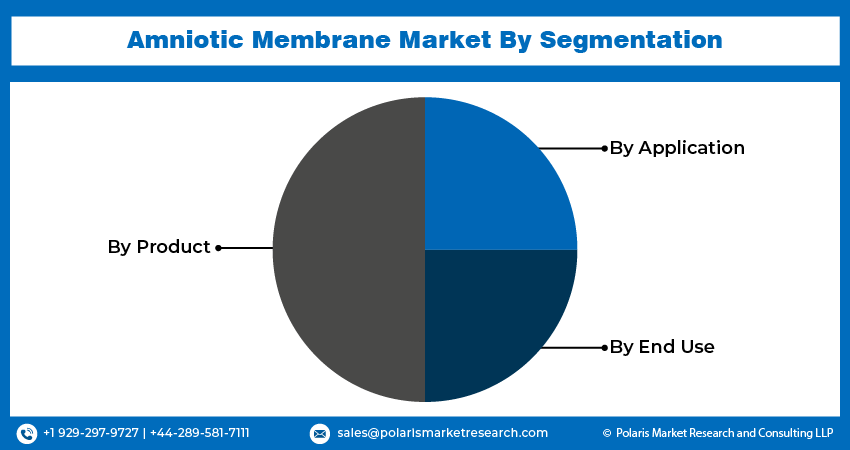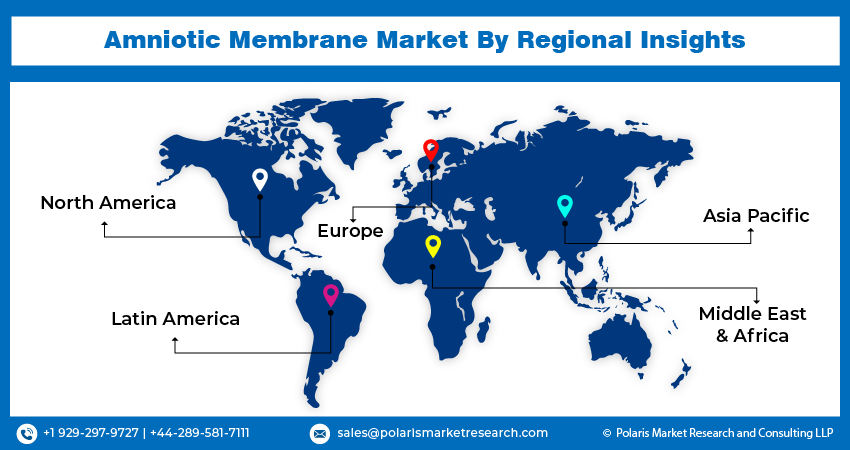
Amniotic Membrane Market Share, Size, Trends, Industry Analysis Report, By Product (Cryopreserved, Dehydrated); By Application; By End-use; By Region, And Segment Forecasts, 2024 - 2032
- Published Date:Jan-2024
- Pages: 118
- Format: PDF
- Report ID: PM3903
- Base Year: 2023
- Historical Data: 2019-2022
Report Outlook
The global amniotic membrane market size and share was valued at USD 4.83 billion in 2023 and is expected to grow at a CAGR of 14.30% during the forecast period.
Amnion membrane aids in wound healing by preventing bacterial growth and reducing pain and has gained increased attention in recent years. This heightened awareness has resulted in a growing demand for tissue-based products derived from the amniotic membrane, driven by a rise in transplant procedures. This increased awareness has led to a surge in the number of donations, further contributing to the growth of the market. It finds applications in various medical procedures, including reconstructing the conjunctiva surface, pterygium excisions, treating surgical wounds, corneal ulcers, and pressure ulcers, addressing limbic stem cell deficiency, and complementing regenerative medicine.
The amniotic membrane, also referred to as amnion, is a thin membrane on the innermost part of the placenta. It consists of a thick basement membrane and surrounds the embryo while delimiting the amniotic cavity. The amniotic membrane is collected from the placenta after birth and comes with several different stem cells and powerful growth factors. Doctors and healthcare professionals use amniotic membranes as a graft to help heal several conditions, including the treatment of dry eye disease.
There are two main types of amniotic membranes. These include the dehydrated amniotic membrane and cryopreserved amniotic membrane. Dehydrated membranes are suitable for storage at room temperature, whereas the cryopreserved membrane must be preserved at a freezing temperature of -80 degrees Celsius. Both types of amniotic membranes have numerous applications in regenerative medicine. They act as a source of various types of stem cells and potent growth factors. Besides, amniotic membranes serve as an effective nano-reservoir for drug delivery. With the rising aging population and growing prevalence of several eye condition types, the amniotic membrane market is projected to develop over the forecast period.

To Understand More About this Research: Request a Free Sample Report
The market report provides a thorough analysis of the amniotic membrane market, covering all the major aspects stakeholders need to know. It sheds light on the key developments and trends that are anticipated to drive the amniotic membrane market demand over the forecast period. Besides, it maps the qualitative impact of various key factors on market segments and geographies. Furthermore, it examines the key steps taken by industry participants to strengthen their presence in the industry.
According to the 2020 data provided by the National Safety Council (NSC) on injuries in the United States, bicycling accounted for the highest number of injuries, totaling approximately 426,000 cases, making it the major cause among all sports and recreational activities. Exercise, whether with or without equipment, is followed closely by around 378,000 injuries. ATV, moped, and minibike usage contributed to 230,000 injuries, ranking third, while skateboard, scooter, and hoverboard use resulted in 218,000 injuries, placing fourth. This rise in the number of injuries and associated trauma often necessitates surgical wound healing, with amniotic membranes being a commonly used treatment option.
Also, the increasing advancements in stem cell and regenerative medicine, substantial investments in research and development, and the increasing prevalence of surgeries conducted on a global scale are poised to exert a significant impact on amniotic membrane market expansion.
- For example, in May 2020, researchers in Italy from the Eugenia Menni Research Centre (CREM) achieved a groundbreaking milestone. They presented the potential of utilizing stem cells derived from the human amniotic membrane to restrict the progression of scarring in pulmonary fibrosis. This pre-clinical investigation holds the promise of ushering in novel therapies for this life-threatening ailment.
Besides product introductions, there is a growing trend of cesarean deliveries in the United States. According to data from the Centers for Disease Control and Prevention (CDC), as of September 2021, the rate of low-risk cesarean deliveries rose from 25.6% in 2019 to 25.9% in 2020, with an increase observed across all racial and Hispanic-origin groups. Research indicates that the use of amniotic membrane dressing effectively reduces post-cesarean section pain and can eliminate the need for pain relief medications among patients.

The COVID-19 pandemic had a profound impact on the supply chain of the entire medical device industry, due to significant changes in how healthcare systems operate. Disruptions affected various aspects, including supply and demand chains, production capabilities, and sales and revenue cycles. These disruptions resulted in constraints on economic activities.
Industry Dynamics
Growth Drivers
Rise in the Aging Population
These tissue-based products find extensive applications in the therapy of various eye surface infections, including conditions like ocular dystrophy, cataracts, corneal ulcers, bacterial keratitis, glaucoma, bullous keratopathy, corneal degeneration, eyelid reconstruction, and more. The global increase in the elderly population has led to a significant rise in ophthalmology surgeries, resulting in a substantial demand for these products. As per the statistics published by the Centers for Disease Control and Prevention (CDC), approximately 1 million individuals are afflicted by eye infections annually.
It has two primary applications: as a surgical graft and as a biological bandage for treating and managing wounds. When used as a graft, these membranes promote re-epithelization by acting as a supportive scaffold. In line with this, in June 2021, Amniox Medical initiated an awareness campaign to emphasize the value of its tissue-based products in reducing the costs associated with wound healing. Particularly in cases of burn injuries, these products, with their anti-inflammatory and anti-scarring properties, play a crucial role in mitigating heightened inflammation and discomfort in patients.
Report Segmentation
The market is primarily segmented based on product, application, end-use, and region.
|
By Product |
By Application |
By End Use |
By Region |
|
|
|
|
To Understand the Scope of this Report: Speak to Analyst
By Product Analysis
The cryopreserved segment accounted for the largest market share in 2022
In 2022, the cryopreserved segment accounted for the largest market share. These are typically employed as biological bandages to facilitate the healing process. Examples of commercially available dehydrated amniotic membranes include PalinGen, FloGraft, AmbioDisk, & AmnioFix. Moreover, these membranes find extensive use in the treatment and management of surgical wounds and incisions, thanks to their properties, which include maintaining a waterproof seal, reducing inflammatory responses, and preventing disease transmission.
By Application Analysis
Surgical wounds segment held the fastest market share in 2022
In 2022, the surgical wounds segment held the fastest market share due to the worldwide increase in the volume of surgical procedures. Furthermore, these membranes play a crucial role in reconstructive surgeries, where they are utilized to enhance the healing process and minimize scarring.
Ophthalmology segment will grow at a robust pace. These products are frequently employed in ophthalmic surgeries to expedite recovery and alleviate inflammation. The statistics published by the American Society of Plastic Surgeons in 2017 revealed that approximately 17.5 Mn cosmetic surgeries were done in the U.S. alone, indicating a growing trend of individuals opting for surgery to enhance their aesthetic appearance.
By End-Use Analysis
The ASCs segment is expected to witness the highest growth during the forecast period.
The ASCs segment is expected to witness the highest growth during the forecast period. This growth is attributed to the increasing utilization of amniotic membranes in these centers, which is expected to drive market expansion. The ease and effectiveness of using these products also promote wound recovery without the need for frequent ASC visits. As per the data published by the SurgeryView product by Definitive Healthcare, in 2022, over 11,800 operative ASCs were operating across the United States.
The hospital segment is attributed to the significant volume of patient visits to hospitals, as they serve as the primary care facilities for a diverse range of medical conditions, making treatment easily accessible.
Specialty clinics can prevent infections & promote wound healing, due to the frequent utilization of the amniotic membranes in concerned settings, which, in turn, contributes to the growth of this segment. Additionally, research and academic institutes play a significant role in the global market due to substantial research and development investments made by major market players and hospitals to explore potential applications of these products. The amniotic membrane serves as a substrate for stem cells, which can be utilized in various other applications, driving increased research efforts in this field.

Regional Insights
North America region held the largest market in 2022
In 2022, North America held the largest market due to its well-established healthcare facilities and the presence of prominent market players. Additionally, the increased emphasis on alternative technologies and the adoption of advanced technologies in the region are anticipated to drive further market growth in the forecast period. The healthcare infrastructure with a high level of technological advancement supports the demand for regenerative medicine, including amniotic membrane applications, in the treatment of various medical conditions.
The region is home to numerous pharmaceutical and biotechnology companies actively involved in research and development related to regenerative medicine. This research includes the development of innovative products and therapies that incorporate amniotic membranes. The region has well-established regulatory agencies, such as the FDA in the United States and Health Canada in Canada, which ensure product safety and efficacy. This regulatory framework provides confidence to both healthcare providers and patients regarding the use of amniotic membrane products.
APAC region held the fastest growth in the market. This growth projection is driven by the economic development of many countries in the region, due to a gradual rise in disposable income. Furthermore, numerous multinational corporations are making substantial investments in this region. Additionally, the presence of significant unmet healthcare needs, coupled with the ongoing development of healthcare infrastructure, particularly in countries like Japan & India, are key factors expected to bolster amniotic membrane market growth.

Key Market Players & Competitive Insights
The market includes a diverse array of both global and local participants. Many of these players have established robust partnerships with tissue banks and hospitals to facilitate placental donations. Furthermore, nearly all major players hold accreditation from the American Association of Tissue Banks (AATB), affirming their ability to deliver quality and sterile products. These aspects are expected to contribute to the market's expansion throughout the forecast period.
Some of the major players operating in the global market include:
- Alliqua BioMedical Inc.
- Amnio Technology, LLC
- Amniox Medical Inc.
- Applied Biologics LLC
- Human Regenerative Technologies, LLC
- Katena Products, Inc.
- MiMedx Group Inc.
- Organogensis, Inc.
- Skye Biologics, Inc.
- Tissue-Tech, Inc.
Recent Developments
- In April 2023, Celularity, specializing in the development of biomaterial products and cell therapies derived from placental sources, collaborated with the CH Trading Group.
- In March 2022, Laboratories Thea signed an agreement with the Akorn Operating Company to acquire seven branded ophthalmic products, among them AcellFX (amniotic membrane for ocular surfaces). This move is aimed at enhancing their footprint in the United States.
Amniotic Membrane Market Report Scope
|
Report Attributes |
Details |
|
Market size value in 2024 |
USD 5.51 billion |
|
Revenue Forecast in 2032 |
USD 16.11 billion |
|
CAGR |
14.30% from 2024 – 2032 |
|
Base year |
2023 |
|
Historical data |
2019 – 2022 |
|
Forecast period |
2024 – 2032 |
|
Quantitative units |
Revenue in USD billion and CAGR from 2024 to 2032 |
|
Segments Covered |
By Product, By Application, By End Use, By Region |
|
Regional scope |
North America, Europe, Asia Pacific, Latin America; Middle East & Africa |
|
Customization |
Report customization as per your requirements with respect to countries, regions, and segmentation. |
Delve into the intricacies of amniotic membrane in 2024 through the meticulously compiled market share, size, and revenue growth rate statistics by Polaris Market Research Industry Reports. Uncover a comprehensive analysis that not only projects market trends up to 2032 but also provides valuable insights into the historical landscape. Immerse yourself in the depth of this industry analysis by acquiring a complimentary PDF download of the sample report.
